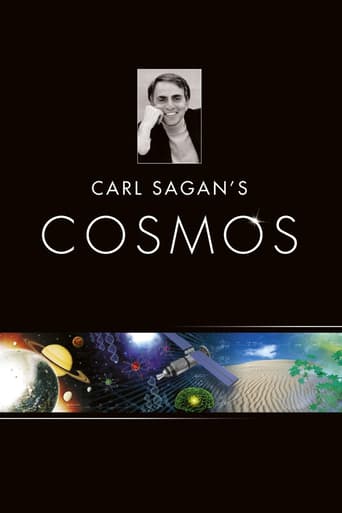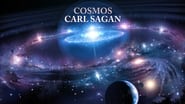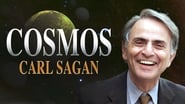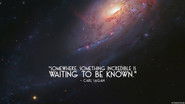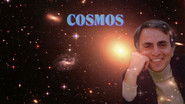movies-109
1980 was a tumultuous year for me. I was 22 years old trying to prove myself in a competitive field, working lots of hours. I believe Cosmos originally aired on Monday nights on public TV, and I made sure I got home in time to see each episode. I turned out the lights and devoted my entire attention to the program. No pause buttons then, no streaming, and on public TV - no commercial breaks.The hypnotic voice of Carl Sagan takes us on a voyage totally beyond anyone's experience at the time, and fascinating because it's not science fiction, it's real. This program is so good that almost 38 years later it's still relevant.The DVD edition has a few updates but the original program is intact within, missing only that KCET station bumper that always gave me a chill because for the next hour, I knew I was going to be on a brain massage.Neil DeGrasse Tyson's 2014 redux of Cosmos stands on its own and its HD effects are far superior to the 1980 program made for broadcast television. I've watched it repeatedly as well, but the original is magic. I'm starting it over again with part one.We are made of star stuff. One does not need to believe in God, or be an athiest, or be anywhere between to appreciate what Carl Sagan presented to the world during one of its most dangerous years. Star stuff.
Stoh80
From the Big Bang to the first humans, from the smallest atoms to the grandest of galaxies, Cosmos: A Personal Voyage does it all. Carl Sagan, an astronomer and one of the greatest popularizers of science of all time, addresses in this 13 episode series some of the more profound questions that humans sometimes find themselves asking. "How did we get here?" "What lies out in space beyond the Earth?" Sagan does it all through a scientific point of view, while still keeping it personal and easy to understand for the audience.Don't think that just because Cosmos is from 1980 that it is outdated. It is a very well done series, and the themes that it addresses are just as relevant to today's world as it was when this program first came out. While it mostly focuses on scientific topics such as space exploration, evolution, and the human brain, it also brings up topics like nuclear disarmament and the danger of believing in superstition. While Sagan makes sure that every statement he says is supported by evidence, he is not afraid to say that, at least at the time, there are some things in the universe that science simply does not know.Using plenty of visuals and layman's terms, Sagan does a good job to make sure the viewer doesn't feel alienated from the complex issues that this series tackles. Cosmos is not some cold educational program. It is also very emotional, showing us how small we are in the universe and how fragile our planet actually is. Watching this series has allowed me to understand some basic things about the universe that I never even considered—"In order to make an apple pie from scratch, you must first invent the universe." I wholeheartedly recommend this program to any human capable of thinking. Even if you think science is only something that a small, eggheaded elite can understand, watching Cosmos: A Personal Voyage should be more than enough to change your mind, and give you more of an idea exactly what our place is in the universe.
sam-965-78538
basically everything has been said here, this is sort of an epic series. No matter if you like the topic or don't, its one of those thing that boarders perfection. Through this "epic journey" Sagan educates us on the true meaning of life, and the importance that each individual has to the contribution to the universe. Probably the most astounding thing about this film is the fact that it was made in the late 70s, and its facts still hold true today. Carl was a visionary that we will all miss, bit this mini series will be one of those documentaries that will stand the test of time. Its sort of the only documentary i have ever seen that truly does not have a bias, its just there for the betterment of mankind. In the end "we are all star stuff."
Robert J. Maxwell
Well, it's hard to imagine a better introduction to astronomy, or to science and history, than this series distributed by Public Broadcasting System and hosted by Carl Sagan. I watched it when it first aired and recently saw it again, and it's as impressive now as it was in 1982.Much depends on Carl Sagan, who takes us through the universe, from atoms to billions and billions of stars and galaxies, and he delivers it all very smoothly. A nice, casual guy who wears sports clothes and speaks mellifluously, Sagan knows what he's talking about and gives us an occasional personal or humanitarian gloss. He's one of those professors, like Vincent Scully, who seems genuinely awed by the things he's describing.A stellar list of advisors, artists, and animators suggests the enormous effort that went into this project.I don't expect to see anything more entertaining, informative, and inspiring about this subject.
